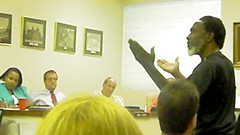Pace Lattin wrote for Technorati,
Federal Courts Rule it is Not Illegal to Film Police
John S. Quarterman
This specific case in question was Simon Glik vs.The City of Boston
(and several police officers), in which a teenage Simon Gilk was arrested
after videotaping Boston Police abusing a homeless man. While Mr. Gilk was
not interfering with the police, he was arrested on wiretapping charges.
The ACLU had sued on his behalf, even when the charges were dropped,
noting that there was a growing epidemic of citizens in the United States
being arrested by police for videotaping, even when documenting police
brutality and abuse.
The First Court Agreed with the ACLU that this should be legal, and wrote
that: “The filming of government officials engaged in their duties in a
public place, including police officers performing their responsibilities,
fits comfortably within these principles [of protected First Amendment
activity].
Why has this become an issue lately?
But with all that we would still need
communities watching boards.
Fortunately, the Valdosta Police Department
seems rather media savvy
and the Lowndes County Sheriff’s Department knows the law,
at least according to informal chats I’ve had with deputies.
So there’s no reason to expect any problems with videoing of open meetings
or of law enforcement around here.
Is there?
-jsq
Short Link:
 The First Court of Appeals has reached a decision that would allow the
general public to video-tape police officers while they are working. This
decision comes right after several well-known public cases have come to
light involving citizens being arrested for video-taping police.
The First Court of Appeals has reached a decision that would allow the
general public to video-tape police officers while they are working. This
decision comes right after several well-known public cases have come to
light involving citizens being arrested for video-taping police.
 The Atlanta Police Department already avoided this problem
by settling a previous case and making a policy that citizens can video police.
This appeals court ruling
now says anybody can, nationwide, because of the First Amendment.
The Atlanta Police Department already avoided this problem
by settling a previous case and making a policy that citizens can video police.
This appeals court ruling
now says anybody can, nationwide, because of the First Amendment.
With the rise of YouTube and other social sharing services, more and more
police have been under scrutiny for their public actions and in response
have taken to pressing charges against civilians for videotaping them.
 Hm, like
George Rhynes was talking about at last week’s VBOE meeting.
You know, even if the news media were trying to cover everything,
there simply aren’t enough newspapers and TV stations to do so,
and their formats don’t permit enough time or space to publish it.
Unless, of course, they take up video cameras and online publishing
like LAKE and K.V.C.I. have.
We’ve seen some preliminary moves in that direction by some local
traditional media; let’s hope they do more of that.
Hm, like
George Rhynes was talking about at last week’s VBOE meeting.
You know, even if the news media were trying to cover everything,
there simply aren’t enough newspapers and TV stations to do so,
and their formats don’t permit enough time or space to publish it.
Unless, of course, they take up video cameras and online publishing
like LAKE and K.V.C.I. have.
We’ve seen some preliminary moves in that direction by some local
traditional media; let’s hope they do more of that.
 And it would help if
local elected and appointed boards would video their own meetings and put them online.
And it would help if
local elected and appointed boards would video their own meetings and put them online.
 And police.
And police.
Boston catches up with Atlanta: you can video police
Poilce are public employees, and the public has a right to video them doing their duty; so says a federal appeals court.